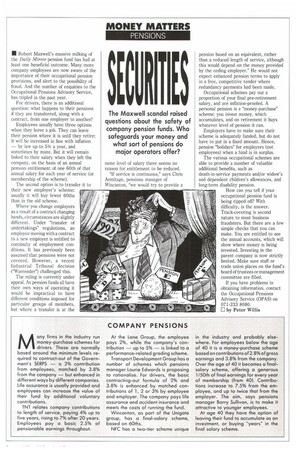COMPANY PENSIONS
Page 41

If you've noticed an error in this article please click here to report it so we can fix it.
Many firms in the industry run money-purchase schemes for drivers. These are normally based around the minimum levels required to contract-out of the Government's SERF'S — a 2% contribution from employees, matched by 3.8% from the company — but enhanced in different ways by different companies. Life assurance is usually provided and employees can increase the value of their fund by additional voluntary contributions.
TNT relates company contributions to length of service, paying 4% up to five years, rising to 7% after 20 years. Employees pay a basic 2.5% of pensionable earnings throughout. At the Lone Group, the employee pays 2%, while the company's contribution -up to 5% — is linked to a performance-related grading scheme.
Transport Development Group has a number of schemes which pensions manager Laurie Edwards is proposing to rationalise. For drivers, the basic contracting-out formula of 2% and 3.8% is enhanced by matched contributions of 1, 2 or 3% by employee and employer. The company pays life assurance and accident insurance and meets the costs of running the fund.
Wincanton, as port of the Unigate group, has a final-salary scheme, based on 60ths.
NFC has a two-tier scheme unique in the industry and probably elsewhere. For employees below the age of 40 it is a money-purchase scheme based on contributions of 2.8% of gross earnings and 3.8% from the company. Over the age of 40 it becomes a finalsalary scheme, offering a generous 1/50th of final earnings for every year of membership (from 401. Contributions increase to 7.5% from the employee, and up to twice that from the employer. The aim, says pensions manager Barry Sullivan, is to make it attractive to younger employees.
At age 40 they have the option of leaving their fund to accumulate as an investment, or buying "years". in the final salary scheme.












































































